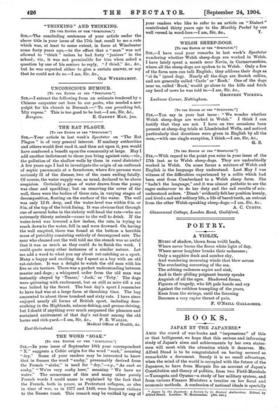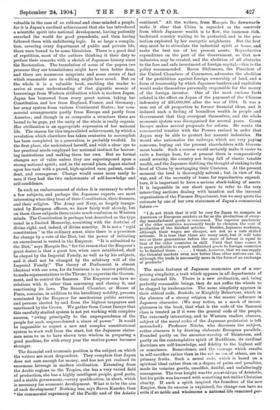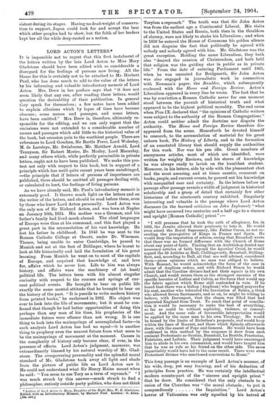BOOKS.
AMID the crowd of war-books and "impressions" of this or that belligerent, we hope that this serious and informing study of Japan's aims and achievements by her own states- men will meet with the attention which it deserves. Mr. Alfred Stead is to be congratulated on having secured so remarkable a document. Surely it is no small advantage, when the mind of the world is occupied with the future of the Japanese, to have from Marquis Ito an account of Japan's Constitution and theory of politics, from two Field-Marshals —Yamagata and Oyama—a study of her military system, and from various Finance Ministers a treatise on her fiscal and economic methods. A confession of national ideals is specially * Japan by the Japanese: a Survey by its Highest Authorstieu, Edited by Alfred Stead. London: 'W. Heinemann. [20a. net.]
• valuable in the case of so rational and clear-minded a people, for it is Japan's cardinal achievement that she has introduced a scientific spirit into national development, having patiently searched the world for good precedents, and then having followed them with unfaltering logic. In so large a compila- tion, covering every department of public and private life, there were bound to be some blemishes. There is a good deal of repetition, most of the authors thinking it their duty to preface their remarks with a sketch of Japanese history since the Restoration. The translation of some of the papers (we presume they are translations) might have been better done, and there are numerous misprints and some errors of fact which reasonable care in editing might have saved. But on the whole it is a valuable book, enabling the reader to arrive at some understanding of that gigantic mosaic of borrowings from Western civilisation which is modern Japan. Japan has borrowed from every great nation, taking her Constitution and law from England, France, and Germany; her army system from various Continental States ; her com- mercial arrangements partly from Europe and partly from America; and though in so composite a structure there are bound to be gaps, yet the unity of the whole is really organic. Her civilisation is an appropriate expression of her national life. The reason for this unparalleled achievement, by which a revolution which elsewhere has taken centuries to accomplish has been completed in a generation, is probably twofold. In the first place, she understood herself, and with a clear eye to her practical needs employed her national instinct for borrow- ing institutions and making them her own. But no formal changes are of value unless they are superimposed upon a strong national spirit; and, in the second place, Japan started upon her task with a proud, high-spirited race, patient, confi- dent, and courageous. Change would come more easily to men if they had the two endowments of self-knowledge and self-confidence.
In such an embarrassment of riches it is necessary to select a few subjects, and perhaps the Japanese experts are most interesting when they treat of their Constitution, their finances, and their religion. The Army and Navy, as largely inaugu- rated by European officers, we know fairly well already, but on these three subjects there exists much confusion in Western minds. The Constitution is perhaps best described as the type usual in a limited Monarchy, coexisting with the doctrine of divine right, and, indeed, of divine sanctity. It is not a "rigid constitution" in the ordinary sense, since there is a provision for change by a vote of the Diet, but the power of initiating an amendment is vested in the Emperor. "It is submitted to the Diet," says Marquis Ito, "for the reason that the Emperor's great desire is that a great law, when once established, shall be obeyed by the Imperial Family, as well as by his subjects, and it shall not be changed by the arbitrary will of the Imperial Family." The theory of Parliament is almost identical with our own, for its business is to receive petitions, to make representations to the Throne, to supervise the Govern- ment, and to control the finances. The Emperor can have no relations with it, other than convening and closing it, and sanctioning its laws. The Second Chamber, or House of Peers, contains, in addition to the hereditary nobility, persona nominated by the Emperor for meritorious public services, and persons elected by and from the highest taxpayers and sanctioned by the Crown. We gather from Count Inouye that this carefully studied system is not yet working with complete success, "owing principally to the unpreparedness of the people for such unprecedented a share of power." It would be impossible to expect a new and complex constitutional system to work well from the start, but the Japanese states- men seem to us to have shown true wisdom in preparing a good machine, for with every year the motive-power becomes stronger.
The financial and economic position is the subject on which the writers are most despondent. They complain that Japan does not care enough for money, and has not yet realised its enormous leverage in modern civilisation. Extending from the Arctic regions to the Tropics, she has a very varied field of production, she has a highly intelligent people, good ports, and a stable government,—every qualification, in short, which is necessary for economic development. What is to be the aim of such development? Nothing less, says Baron Kaneko, than "the commercial supremacy of the Pacific and of the Asiatic
continent." All the writers, from Marquis Ito downwards make it clear that China is regarded as the reservoir from which Japanese wealth is to flow, the immense rich, backward country waiting to be protected, and in the pro- tection exploited by her energetic neighbours. But the first step must be to stimulate the industrial spirit at home, and make the best use of her present assets. Reproductive expenditure • on the part of the Government, so that new industries may be created, and the abolition of all obstacles to the free and safe investment of foreign capital,—this is the policy recommended. Baron Shibusawa, the President of the United Chambers of Commerce, advocates the abolition of the prohibition against foreign ownership of land, and a form of trusteeship by which Japanese bankers and capitalists would make themselves personally responsible for the money of the foreign investor. One of the most curious facts related is the effect on Japan of the payment of the Chinese indemnity of 235,000,000 after the war of 1894. It was a sum out of all proportion to former financial ideas, and it induced such a feeling of boundless wealth in people and Government that they overspent themselves, and the whole economic system was disorganised for several years. Count Inouye makes several proposals for reform. He wants the commercial treaties with the Powers revised in order that
Japan may be able to protect her nascent industries. He would also nationalise the railways, which are very paying
concerns, buying out the present shareholders with Govern- ment bonds. Such a course would certainly make it easier to raise a foreign loan, for at present there is comparatively small security, the country not being full of elastic taxable wealth, and the Japanese disliking the thought of sinking to the level of China by mortgaging their Customs. At the present moment the land is thoroughly solvent ; but in view of the war, and of the necessity of loans for reproductive expendi ture, it is important to have a serious stock-taking of assets It is impossible in our short space to refer to the very interesting sections dealing with taxation and the internal organisation of the Finance Department, but we may quote the estimate by one of her own statesmen of Japan's commercial future :—
"I do not think that it will be easy for Japan to compete in American or European markets as far as the production of every- day manufactured goods is concerned. The superior machinery of the older countries necessarily tends to cheapen the cost of production of the finished articles. Besides, Japanese workmen, although their wages are cheaper, are not as a rule skilled artisans. It is true that there are many such, but it will take two or three generations before the mass of labour is equal to that of the older countries in skill. Until that time comes it is more profitable to export unfinished goods to foreign countries
to be finished there I think, however, that we can supply the Oriental markets even now better than other nations can do, although the trade is necessarily more in the form of an exchange of products."
The main features of Japanese economics are of a sur- prising simplicity, a trait which appears in all departments of their national life. Theirs is a new civilisation, and, being perfectly reasonable beings, they do not suffer the wheels to be clogged by irrelevancies. The same simplicity appears in their ethical code, Bushiclo, or Knightly Behaviour, which in the absence of a strong religion is the master influence in Japanese character. (We may notice, as a mark of incom- pleteness in the book, that what is the code of the Samurai
class is treated as if it were the general code of the people. The extremely interesting, and to Western readers obscure,
subject of the moral codes of the Japanese proletariat is left untouched.) Professor Nitobe, who discusses the subject, rather obscures it by drawing elaborate European parallels. Founded partly on the ancestor-worship of Shintoism, and
partly on the contemplative spirit of Buddhism, its cardinal doctrines are self-knowledge, and fidelity to the highest self or conscience. Benevolence, and the courage which results
in sell-sacrifice rather than in the sub. ee ion of others, are its primary fruits. Such a moral code, which is based on a spiritual ideal rather than on a dogma of pains and penalties, made its votaries gentle, unselfish, dutiful, and unfalteringly courageous. The true knight was the i.ceysexistvxor of Aristotle, but his pride was leavened with something not unlike Christian charity. If such a spirit inspired the founders of the new Empire, then its success is explained, for change can have no evils if so noble and wholesome a national life remained per-
sistent during its stages. Having no dead-weight of conserva- tism to support, Japan could look for and accept the best which other peoples had to show, but the faith of her leaders kept her all the while deep-rooted as a nation.








































 Previous page
Previous page